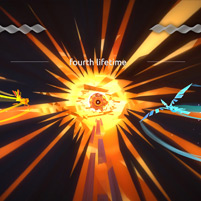Entwined in Education


Screen stills from Entwined
PlayStation announced a new game at the Electronic Entertainment Expo inspired by a Chinese myth about two souls in love that can't be together.
It came from Pixelopus, a studio that includes recent graduates from Carnegie Mellon University's Entertainment Technology Center (ETC) who know all about collaboration.
When Sony Computer Entertainment America (SCEA) sponsored a project at the ETC, the game company was less interested in getting a finished product than it was in learning about the process ETC uses to rapidly and collaboratively produce innovative games and interactive experiences.
That research relationship has evolved into the foundation of one of PlayStation's newest studios, Pixelopus. The studio consists of recent graduates from the ETC and San Jose State University and includes veteran game developers Dominic Robilliard and Jeff Sangalli.
In the game, players simultaneously control Entwined's two characters, represented by a bird and a fish. The game is available for the PS4 system via PlayStation Store and will be released later on PS3 and PS Vita.
Alex Lee, executive producer at Sony Computer Entertainment America's San Mateo Studio, said that PlayStation is involved in outreach at many universities, but its interactions with Carnegie Mellon are different.
"The Entertainment Technology Center is somewhat unique in the way it offers projects," Lee said. "It's such a wonderful opportunity to celebrate the way these guys work — the passion and heart they put into this game."
The relationship, which started in the fall of 2012, has been beneficial to SCEA and students. PlayStation, so far, has sponsored two projects. While the students were learning in their project room, SCEA was learning about what worked and what didn't.
Lee, who was a Sony adviser along with Ken Inagaki on the fall 2012 project named PlayStation BlackLight, said the documentation provided by the team to show why something failed and how it could be fixed was valuable.
The assignments the students received were similar to those exercises used as the foundation of the ETC's Building Virtual Worlds, the legendary class that takes students with varying talents, backgrounds and perspectives and trains them to collaborate in order to do what they couldn't do alone.
Chris Klug served as the Playstation Blacklight course instructor.
"It was intentional on Sony's part that the short three-week design challenges would emulate Building Virtual Worlds," Klug said. "Clients come to the ETC for a number of reasons. They don't necessarily want a finished project. Sometimes they need an outside team to perform some R&D on an idea that can't get room to breath inside the company's walls. In most cases, our students' training in rapid iteration, collaborative design combined with strong prototyping skills give them an edge."
PlayStation later offered internships and full-time jobs to several of the students, including Jing Li, now Pixelopus' game designer.
Li majored in digital media technology at Nanjing University of Posts and Telecommunications before earning her master's of entertainment technology degree at CMU.
"It's been a dream for me," Li said. "I started playing games when I was 4. I always wanted to make games. ETC was the top school in the research, and I was inspired by Randy Pausch and 'The Last Lecture.'"
The team works together, and everyone has input into the process, Jing said.
Pixelopus' name comes from combining the smallest element in creative media and the concept of a grand scale artwork.
"As a team, we have grown a lot," she said. "It's really been an honor to work with so many industry veterans, both at the ETC and here."
Bringing the small team with its philosophy of rapid creation into the grander corporate structure has led to innovative results, Lee said.
Klug points out that the project-based culture of the ETC is where the process all began.
"The whole experience has shown the potential of how the ETC's methodology is more applicable now than ever," Klug said.
Related Links: Entertainment Technology Center | Building Virtual Worlds | PlayStation Blog
